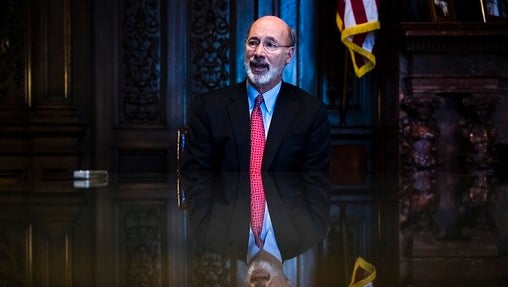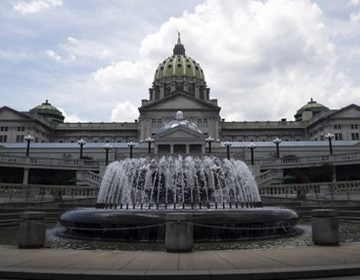Harsh words in Harrisburg over Wolf’s Farm Show deal
Republican state lawmakers wrapped up three weeks of annual budget hearings by tearing into Governor Tom Wolf's administration for several hours straight.

Governor Wolf opted to fill a gap in the state budget by leveraging the Farm Show complex for a loan. GOP lawmakers had intended for him to raid special funds. (Matt Rourke/AP Photo)
Republican state lawmakers wrapped up three weeks of annual budget hearings by tearing into Governor Tom Wolf’s administration for several hours straight.
The crime, as they see it?
Making what the GOP alleges is an unconstitutional deal to close this fiscal year’s budget deficit.
When they ended a long, bitter budget standoff in October, lawmakers left a $300 million hole in their revenue plan for Wolf to fill with money from the state’s special funds. GOP lawmakers had pushed hard to tap the funds in lieu of new spending, and expected Wolf to reroute existing money. But instead, he filled most of the gap through a deal that leverages the Pennsylvania Farm Show complex for $200 million, and puts that money in its own, new special fund.
Lancaster-based Blackford Ventures, the venture capital company that won the bidding process, gave the state the money up front. It’ll be paid back with more than $191 million in interest over 29 years, starting in the 2019-20 fiscal year.
The deal isn’t quite finalized.
Budget Secretary Randy Albright said the first portion, completed in January, resembles a normal loan with the private company. The second part will involve a lease-leaseback agreement on the Farm Show complex. That transaction probably won’t happen until summer, according to Albright, because it has to be made after two other financing deals the commonwealth used to balance the budget.
The administration said the transaction won’t affect Farm Show operations at all, and the state is in no danger of losing the facility if it defaults.
In the hearing, Albright repeatedly maintained that the move complies with the letter of the budget plan.
“We were given the unfettered authority to identify, among special funds and accounts, $300 million to balance the budget,” he told GOP questioners.
But Republicans say the deal is unconstitutional, because the administration didn’t have specific permission to incur debt.
“If we give you authority [to find funds to balance the budget] next year will you borrow money on the Capitol?” asked Snyder County Representative Fred Keller.
“You put our grandkids in debt,” he added.
Albright told lawmakers that the Farm Show deal was no one’s ideal solution. And in a statement after the fact, a spokesman for Wolf concurred.
“Governor Wolf has repeatedly made clear he will not cut programs that hurt people or communities, like funds for transportation,” he said. “House Republicans failure to pass a commonsense shale tax forced the Governor to balance the budget through other actions, as required by the General Assembly.”
Republicans are having trouble figuring out if they have any way to stop the Farm Show deal, or punish Wolf for making it. But Representative Seth Grove of York County has one idea: paying the annual $13.5 million fee on the loan out of the administration’s own budget.
“I don’t think the taxpayers should be on the hook for your unilateral actions,” he told Albright.
Albright said the payments are supposed to come out of the commonwealth’s general fund.
GOP lawmakers are also floating the idea of suing the administration, though no moves have yet been made to do so.
WHYY is your source for fact-based, in-depth journalism and information. As a nonprofit organization, we rely on financial support from readers like you. Please give today.





